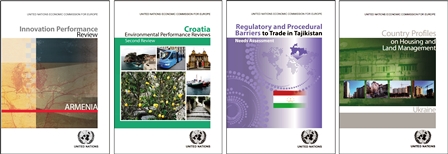
Regional review mechanisms, including peer reviews, can play an important role in the monitoring, evaluation and reporting on the future sustainable development goals. This is acknowledged in the current Zero draft of the outcome document for the UN Summit to adopt the Post-2015 Development Agenda.
In order to enrich the discussions on this issue during the Third High Level Political Forum on Sustainable Development, UNECE organized a side event today in New York to present its more than 20-year experience in using peer review mechanisms to improve policies and their implementation.
UNECE peer review mechanisms offer solid methodology and unique know-how covering four main areas:
· Environmental Performance Reviews,
· Innovation Performance Reviews,
· Country Profiles on Housing and Land Management,
· Studies on Procedural and Regulatory Barriers to Trade.
As recognition of this experience, in 2012 a country outside the region – Morocco – requested UNECE to organise its Environmental Performance Review (EPR). The review of Morocco, conducted in cooperation with the United Nations Economic Commission for Africa, allowed transferring the EPR methodology and know-how to the African region.
The peer review mechanisms assist individual countries in strengthening national policies and implementation of international commitments through external and objective assessment by other Member States. “Croatia participated in two EPR processes which helped improve the national environmental policy in the process of Croatia's accession to the European Union. They were also a significant instrument in our efforts to achieve the Millennium Development Goals”, said Hrvoje Dokoza, Deputy Minister of Environmental and Nature Protection of Croatia.
“EPRs are an invitation to policy dialogue and an opportunity for a mutual learning process. They foster environmental convergence throughout the UNECE region”, said Harry Lehmann from the Federal Environment Agency of Germany.
Monika Linn, UNECE, highlighted the practical value of the reviews. “The recommendations from our review mechanisms have resulted in important policy reforms. For example, the Country Profiles on Housing and Land Management led to development of a state programme on housing for special population groups in Armenia, amendments to the housing code in Azerbaijan, establishment of a state mortgage lending agency in Kyrgyzstan, the creation of a legal framework for social housing in Serbia and the establishment of a government programme for energy-efficient housing in Belarus”.
Policy changes resulting from the Innovation Performance Reviews include: new laws on innovation and intellectual property protection as well as more funding for innovation in Belarus; new laws and programmes promoting venture capital and a new strategy for international cooperation on innovation in Kazakhstan; and improvements in the governance of innovation activities and more financial support for incubators, business parks and innovation centres in Ukraine.
Similarly, the recommendations from UNECE’s study on regulatory and procedural barriers to trade in Tajikistan resulted in detailed action-oriented recommendations, which were integrated into the country’s post-World Trade Organization accession plan pursuant to Presidential Decree No. 691 of 31 October 2014. The Government also decided to integrate the recommendations into the United Nations Development Assistance Framework (UNDAF) for the period 2016-2020.
Participants of the side event discussed the opportunities and added value of using peer review mechanisms in a multi-layered accountability framework on SDGs. Voluntary nature of the mechanisms, as well as their participatory approach that leads to increased accountability of governments to the public, were named among the advantages for using peer review mechanisms. At the same time, the broad scope of SDGs was highlighted among the challenges for applying the peer review approach in the post-2015 review framework. Participants also debated on the opportunities to align existing peer review mechanisms to the SDGs or introduce peer review elements in the SDG review framework.
Note for editors:
Environmental Performance Reviews were launched in 1993 by countries represented at the second Environment for Europe Ministerial Conference (Lucerne, Switzerland). Subsequently, the UNECE Committee on Environmental Policy integrated EPRs in its regular programme. The reviews cover legal, policy and institutional frameworks, financing of environmental policies and projects, protection of air quality and water resources, biodiversity and protected areas, and waste management. They also look into integration of environmental considerations in agriculture, industry, transport, energy, forestry, tourism and health sectors. Forty-three reviews were conducted so far.
Innovation Performance Reviews assess, based on international good practices, the innovation policies and innovation performance of requesting countries, identify strengths and weaknesses, recommend policy reforms to build on the strengths and address the weaknesses, and provide policy advice and capacity building assistance to facilitate the implementation of policy recommendations. The programme was started in 2010. So far, reviews have been conducted for Belarus, Kazakhstan, Ukraine, Armenia and Tajikistan.
Country Profiles on Housing and Land Management are a tool for governments to analyse their housing, urban development and land administration policies, strategies, institutional and financial frameworks and to compare the progress made internationally. They were initiated in 1994 under the UNECE Committee on Housing and Land Management. The Profiles constitute a strategic analysis of a country's entire housing sector as well as urban development and land administration. Recommendations for improving policies and practices are an essential part of the programme. 17 countries have already been covered.
Studies on Procedural and Regulatory Barriers to Trade are undertaken under the auspices of the UNECE Committee on Trade since 2011. These studies focus on procedural and regulatory barriers to trade in goods, with an eye to on-going development efforts in the areas of trade facilitation, technical regulations and standardization policies. The findings of the studies assist countries in their efforts to achieve greater regional and global economic integration, inform donors as to where assistance might be required and strengthen policy discussions within the Committee on Trade and its subsidiary bodies on where additional work is required. So far, studies have been conducted for Belarus, Kazakhstan, Tajikistan and Kyrgyzstan and are currently under preparation for two more countries.

